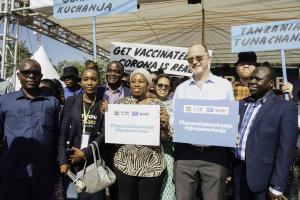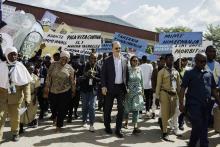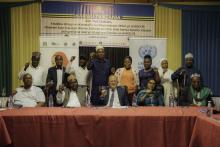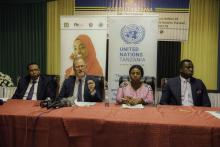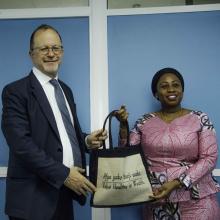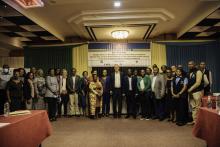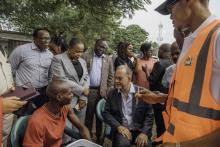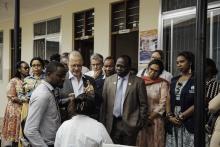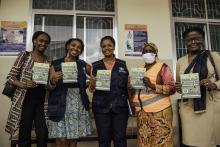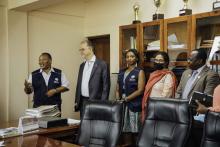Tanzania welcomes Ted Chaiban
Dar es Salaam and Dodoma - The Global Lead Coordinator for COVID19 Vaccine Delivery Partnership (CoVDP), UN Assistant Secretary-General Mr. Ted Chaiban, arrived in Tanzania on 4th July 2022 for a four-day official visit. Accompanied by the Acting WHO Country Representative, Dr. Zabulon Yoti and UNICEF Country Representative, Ms. Shalini Bahughuna; Mr. Chaiban participated in joint high-level advocacy meetings with key government officials including the Vice President Dr. Philip Mpango and the Minister of Foreign Affairs and East African Cooperation Ambassador Liberata Mulamula; Heads of UN Agencies and Development Partners in Dar es Salaam.
In Dodoma, Mr. Chaiban had an opportunity to meet with officials from the Ministry of Health in Tanzania Mainland, Ministry of Finance and Planning and Ministry of State, President's Office Regional Administration and Local Government (PORALG); Non-State Actors (CSOs and NGOs) and faith leaders to deliberate on strategies to accelerate COVID-19 vaccination coverage leveraging existing partnerships; technical and financial resources and political commitment to ensure that COVID-19 response remains a top priority for the country.
Citing progress made by the country, Mr. Chaiban said, “Tanzania was late in rolling out COVID-19 vaccinations, but we commend the government for tremendous effort made to make these vaccines available to its people through mass campaigns and in health facilities".
"Tanzania now needs to keep up the momentum and accelerate vaccinations especially by ensuring that vulnerable groups such as the elderly, people with chronic illnesses are given priority and deliberate effort is put to ensure that all are vaccinated” he added.
Tanzania started COVID-19 vaccination in August in 2021. The initial high demand decreased necessitating ramping up the efforts through accelerated nationwide campaigns. More success has been recorded in the third round of accelerated nation campaign that was launched on 2nd June this year when national vaccination rate was 6.3 percent. As of 5th July, the percentage of total population vaccinated doubled to 12.4 percent.
Speaking with the NSAs, Mr Chaiban commended the work that civil society organizations at subnational level, and the value added that they bring to the global response to the pandemic. “Through your networks at the grass-root level, we can reach the vulnerable populations in the remote rural areas with vaccines and correct information to increase vaccine confidence”. Representatives from the NSAs had an opportunity to highlight achievements and challenges faced in promoting COVID-19 vaccines across the country. “We need to redesign and have common messages that answer community concerns about the benefits of vaccination.” was a contribution from a represented NGO.
Interacting with faith leaders, Mr Chaiban advocated for continued partnership with Faith Based Organizations to ensure that messaging on vaccines reaches the elderly population through the places of worship. “The public (and especially the elderly) continues to look up to faith leaders as role models and as messengers of credible information. In this way, you have an important role in advocating for the needs of vulnerable populations”.
At the beginning of the pandemic in Tanzania, faith leaders were actively engaged in raising awareness about COVID-19 preventive measures among their congregations. Faith leaders helped as first responders and counsellors, combatting stigma, and praying for the world and the policymakers.
Committing to support national efforts in the fight against COVID-19, Chairman of the faith leaders’ association said “We have been role models not only by getting vaccinated in public but also in practicing the safety precautions. We have promoted masking, physical distancing measures, and installed hand hygiene points in the places of worship. We will continue to do so in partnership with the government”.
The mission was supported by technical staff from WHO Headquarters, Regional and Country Offices, who have been supporting vaccination roll out efforts specifically in the areas of microplanning, surveillance, data management and risk communication and community engagement.
In addition, WHO is proving technical and financial assistance in the ongoing nationwide mass vaccination campaigns focusing on two low performing regions – Manyara and Rukwa. In Manyara, WHO and local government authorities have been able to triple the total number of fully vaccinated people from 4.9 to 16 percent in less than 10 days.
WHO, UNICEF and Gavi, the Vaccine Alliance launched the COVID-19 Vaccine Delivery Partnership (CoVDP) in January 2022 to advocate for the urgency in turning vaccine doses into vaccinated, protected communities. The CoVDP builds on existing structures to support the 92 low- and middle-income economies in the COVAX facility focusing foremost on the 34 countries that were at or below 10% coverage in January 2022. Working closely with countries to understand bottlenecks to vaccination, the CoVDP offers access to urgent operational funding, technical assistance, and political engagement to rapidly scale up vaccination and monitor progress towards targets.




